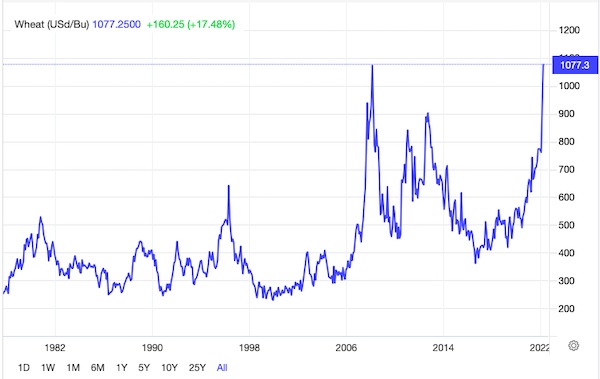forum
library
tutorial
contact

Eastern Oregon Wheat Industry Hopes
Port Labor Issues Don't Disrupt Exports
by Antonio Sierra
Oregon Public Broadcasting, May 17, 2022
|
the film forum library tutorial contact |

|
Eastern Oregon Wheat Industry Hopes
by Antonio Sierra
|
With the contract between the Port of Portland and its dockworker union
ending in July, one Eastern Oregon group hopes for a "quick resolution."
 A potential labor impasse at ports up and down the West Coast could affect people much further inland.
A potential labor impasse at ports up and down the West Coast could affect people much further inland.
According to the New York Times, the contract between the dockworkers union and 29 ports ends in July, and industry members are uncertain about whether both sides will come to an agreement before the expiration date. While any interruption in service at ports could further affect a supply chain under strain from the COVID-19 pandemic and international conflict, it could also come at the expense of eastern Oregon businesses that rely on the ports to sell their products across the Pacific Ocean.
The Port of Portland is one of the most established waypoints in the country for exported wheat, a staple crop in Eastern Oregon. Pendleton wheat farmer and former state senator, Mike Thorne, served as the Port of Portland's director from 1991 to 2001. He has kept tabs on the port since his retirement.
Officials from the International Longshore and Warehouse Union, the union that represents dockworkers, say the pandemic has shown how critical their work is to maintain the flow of goods in and out of the country. Thorne said the union has a reputation for being tough and their ability to control the pace of work that comes through the port gives them strong leverage in negotiations.
"The one union, the one entity that has control of what happens is the longshore union," he said. "And they're gonna walk out of this negotiation with a very, very favorable contract, I would predict."
Amanda Hoey is the CEO of the Oregon Wheat Growers League, a trade organization for the state's wheat farmers. Although soft white wheat is one of Eastern Oregon's top crops, little of it stays in the country: Hoey said 85-95% of the state's wheat is exported to Asia, where it's used for foods like bread and noodles.
The Russian invasion of Ukraine and other global factors have caused the price of wheat to rise sharply in recent months. Hoey said last year's yield was hurt by drought conditions. Farmers expect a better harvest this year due to more favorable weather.
But farmers won't be able to take advantage of high prices if they can't get their products through ports like the Port of Portland. Once the wheat is harvested, it's trucked to a grain elevator and then onto a barge that will eventually make its way down the Columbia River. From Portland, the wheat is transferred to a larger ship and then transported to Asia.
Hoey said the Oregon Wheat Growers League doesn't want to see ports slow down or stop work because of labor issues.
"That certainly would have an impact," she said. "And we can see that impact extending to our customers, so we would absolutely be seeking a quick resolution to it."
The Oregon wheat harvest is expected to begin later this summer.
learn more on topics covered in the film
see the video
read the script
learn the songs
discussion forum
